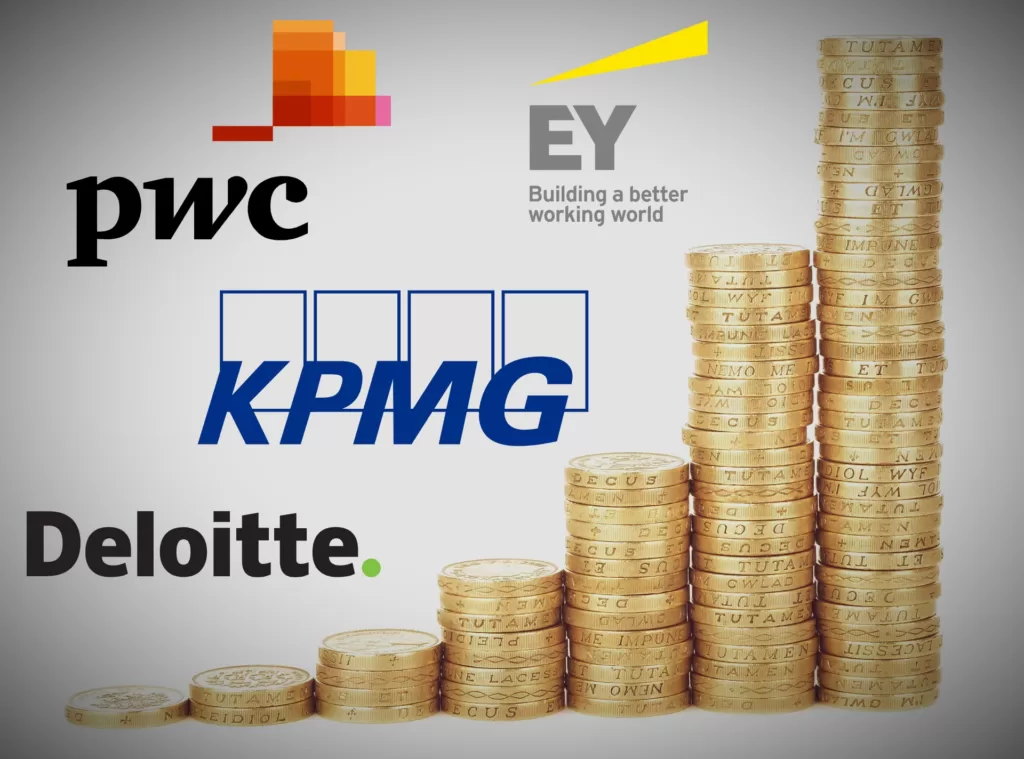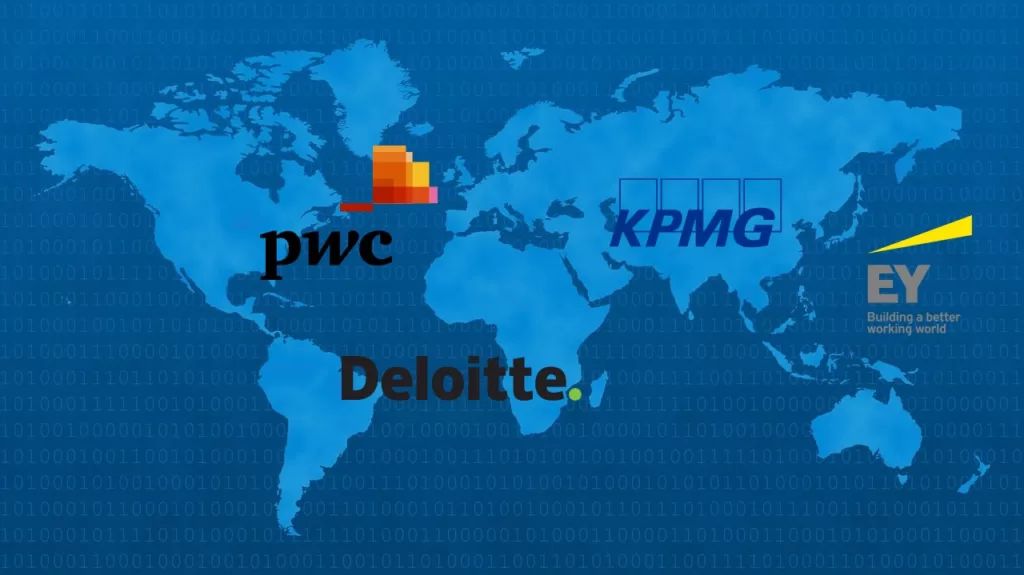We use cookies to improve your experience with Monash. For an optimal experience, we recommend you enable all cookies; alternatively, you can customise which cookies you’re happy for us to use. You may withdraw your consent at any time. To learn more, view our Website Terms and Conditions and Data Protection and Privacy Procedure.
Private profit and a hollowed out public service
Published on August 11, 2023All sides of politics have a hand in how public servants became usurped by global consulting firms. The real winner could be the one who can fix it.
 The Big Four auditing firms work with nearly every single major company on the planet. At the same time, they work extensively with our governments advising them on how to develop laws and policies. : 360info CCBY4.0
The Big Four auditing firms work with nearly every single major company on the planet. At the same time, they work extensively with our governments advising them on how to develop laws and policies. : 360info CCBY4.0
All sides of politics have a hand in how public servants became usurped by global consulting firms. The real winner could be the one who can fix it.
On the eve of Australia’s last federal election, then-Prime Minister Scott Morrison announced that his government, if re-elected, would cut AUD$3.3 billion from the Australian Public Service.
Over the next four years, the Liberal-National coalition would, it promised, cut 5,500 jobs from the APS to pay for the potential new government’s election promises. Morrison claimed the multi-billion cut “doesn’t impact on programs or services at all. It never has”.
A year later, following a public service audit, it was revealed Morrison’s government spent AUD$20.8 billion outsourcing work in 2021-2022.
After Anthony Albanese’s Labor Party won the 2022 Federal Election, the new Minister for the Public Service, Katy Gallagher, said the former government promoted a “mirage of efficiency but were at the same time spending almost AUD$21 billion of public money on a shadow workforce that was deliberately kept secret.”
The government inherited an Australian Public Service that had been slowly perishing for decades.
An estimated 13,000 to 18,000 bureaucrat jobs had been cut from the public service since the Liberal-National coalition took power in 2013.
The scale of institutional memory lost to the APS was reported as “one of the country’s core institutions suffers a form of organisational dementia”.
The cuts can not be blamed on one side of politics. It followed a pattern of decision-making back to the 1970s.
Consecutive governments of both major parties have employed the policy of the efficiency dividend since 1986, which creates an annual reduction in resources.
Breaking up agencies started happening with Labor hero Gough Whitlam in the 1970s and began in earnest under the Liberal Party’s Malcolm Fraser.
Fraser’s government (1975-83) was accused of “lobotomising the public service” after he “eliminated a number of agencies and used a strategy of staff ceilings on public service numbers” during his tenure.
This experience matches the overwhelming narrative of Western governance in the 1980s and its co-existence with the neoliberal doctrine, a composite of free market first political ideologies, which when boiled down is considered to be the “liberalising of global markets associated with the reduction of state power”.
The cuts in Australia are reflected in civil service departments across the developed world, from the United Kingdom to the United States and Canada.
The ideology was a heady mixture of the spoils of the Cold War era of Ronald Reagan and Margaret Thatcher, their commitment to deregulation and a reimagined social contract between the government and its people.
These ideological changes to its fundamental purpose saw Reagan claim in his inaugural address as president that “… government is not the solution to our problem; government is the problem”. While at the same time being the head of a government.
The 1980s, which led to previously unthinkable wealth, had a counterweight. Much of the work to control the extremities of capitalism and industry is done by governments. However, they had now been either suppressed, removed altogether or willfully joined the parade of deregulation.
The underlying logic, as Dr Marty Bortz from the Melbourne School of Government at the University of Melbourne claims in his article, The shadow government plundering the public purse, from Canberra to London became “the underlying logic was that the private sector knows best”.
The Big Four (PricewaterhouseCoopers, Ernst & Young, Deloitte and KPMG) have done well out of the trade winds of this age. In 2021, the global consulting services market was valued between $USD700 billion and $USD900 billion.
While the relationship between the government and its civil service may have changed since the 1980s, their responsibilities continued. External consultants have instead filled the fundamental roles of service delivery and frank and fearless advice in some capacities.
Former Public Service Commissioner and Honorary Professor of Public Policy at the Australian National University Andrew Podger believes that “ideology began to play a more explicit part from the late 1990s”.
“A ‘Yellow Pages’ approach was … suggested, where any activities that private businesses revealed in the Yellow Pages that they deliver should not be undertaken by the government itself but outsourced instead,” he says.
“Privatised policy-making” became a growing concern as governments further relied on these agencies for digital transformation and advisory services through the millennium and into the 21st century.
Podger says “the APS of the early 1970s was too independent and too insular, and it needed to be more responsive to the elected government … but the scale of increased political control and use of external labour over the last three decades has adversely affected the capability and performance of the APS and led to some other failings”.
In Australia, the Centre for Public Integrity released data that the Big Four consulting firms saw a 1,270 percent increase in contracts from the Commonwealth from 2012-2022. At the same time, they also contributed AUD$4,289,253 in donations to the two major parties.
The conflicts of interest grew. La Trobe University’s Stuart Kells claims that “the Big Four have become in some respects competitors to and substitutes for some functions of government”.
“As well as standing alongside public sector clients as trusted advisors, the Big Four sometimes sit on the opposite side of the table, advising corporates and other entities in conflict with the government and, sometimes, in conflict with the public interest,” he says.
These conflicts became a sharp public focus in 2023 when the Australian affiliate of PwC was accused of misusing confidential government tax information for commercial gain.
PwC had been tasked with advising the Australian government on the design of stricter multinational tax laws and had been leaking that same information to companies so they could evade potential new taxes.
Despite the unfolding saga, PwC still holds significant consultancy contracts with the Australian government, with agreements worth an estimated AUD$500 million.
The government and consultancy firms are heavily intertwined.
Podger believes that using long-term contractors sitting beside APS employees doing similar ongoing work raises a fundamental constitutional issue, as questions of accountability and the potential subversion of executive power fail to be adequately addressed.
“If they [consultants] are in effect Commonwealth employees, they should be employed under powers authorised by the Parliament such as the Public Service Act. That might also make them subject to legislated codes of conduct,” he writes.
However, those grey areas and fine margin calls are frustrating regulators.
In a Faustian-style bargain, the public service has become a “captive of the industry”, according to Scott Donald from UNSW. With less investment in government services, the government is spending more on consultants who advise to bring in more consultants.
By the very nature of their establishment, external contractors are accountable to their employers first, not their employers’ contracts.
As Christopher Wright from the University of Sydney says: “Their survival depends upon winning and maintaining client relationships such that an ongoing line of business contracts is maintained.”
According to the Australia Institute, less than 20 percent of consultants’ reports to the government are published, a failing that implies governments could seek advice from consultants in line with the answer they want, as opposed to the reality of a situation. Governments are then able to blame consultants for news the public may not wish to receive.
Canadian academics Denis St Martin and Chris Hurl, however, say governments are not just unfortunate witnesses to unscrupulous consultancy firms. “They influence the decision to hire outside experts by creating uncertainty while offering a readily available solution. They make clients addicted to, or over-reliant on, their expertise,” they say.
The public service is held to account via a range of codes of conduct bound by government acts.
Consultants are not.
Australia’s PwC tax scandal in isolation is shocking, but the involvement of PwC in the much-maligned ‘Robodebt’ scandal speaks to a pattern.
PwC was employed to undertake “an independent review of the compliance and fraud activities” within the Department of Human Services. The expectation was a 100-page report. What was delivered was eight slides for a PowerPoint presentation.
For that, the firm received AUD$853,859, which it said it would return after its involvement in the twin scandals became public in 2023.
The money is a mere drop in the ocean for these global behemoths. Reportedly the refund “would mean a roughly 0.03 percent hit to its annual revenue of $2.6 billion”.
The task of unpicking consultant firms’ influence, the concerns of ethics and conflicts of interest will continue to ricochet across governments of the world despite the current Australian focus.
Calls for increased regulation and greater transparency are just the beginning of this debate, with professors James Guthrie and Allan Fels claiming that the time is now to break up the Big Four.
“As a matter of priority, the various parliamentary inquiries now underway should investigate conflicts of interest and dubious ethical practices by the Big Four and those legal firms that provide aggressive taxation advice.”
The world is watching on as these firms are dragged before senate and committee hearings by governments across the globe. Their attempts are trying to count the cost of how deep the rot goes in their civil services.
Originally published under Creative Commons by 360info™.
Editors Note: In the story “The consultancy conundrum” sent at: 16/08/2023 10:22.
This is a corrected repeat.
















